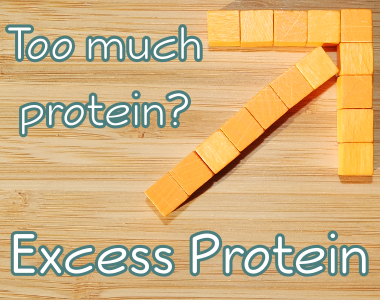Protein Excess - Too Much Protein Unhealthy?

Proteins are life-sustaining macronutrients, which are composed of amino acids. They are the main building blocks for cells and muscle tissue. Due to the positive effects on muscle gain too many proteins are added, whereby the recommended need of protein is significantly exceeded in many athletes. An excess amount of protein is often associated with negative effects on the kidneys and bones. But preliminary: Scientific evidence does not exist.
Are Too Many Proteins Harmful?
Even a 35% proportion of proteins of the daily energy requirement appears to be well tolerated by the body of healthy people 1. But there are not enough data yet to establish daily limits on protein. However, currently a daily maximum of 3.5 g per kg body weight for well-adjusted adults is assumed 2.
In another study with two groups, the participants of the first group took in 4.4 g of protein per kg of body weight in average (138 in total. G ± 42 g) and the people in the control group 1.8 g (in total 307 g ± 69 g protein) daily over eight weeks at a time 3. There were no differences in training volume in any of the groups. In addition, both groups had no significant changes in body weight, fat mass, fat free mass or body fat.
According to a study from 2015 there were no harmful effects on the health of the body with a protein-rich diet with 3.4 g protein per kg body weight 4. Also, scientists think that a high protein consumption in conjunction with a sophisticated resistance training can have advantages in terms of body composition.
The risks of a diet rich in proteins are minimal for healthy athletes 5. In addition, the excess amino acids are broken down and used for energy production or for gluconeogenesis (formation of glucose).
A long-term consumption of up to 2 grams of protein per day per kilogram of body weight is considered as safe in healthy adults 6. Chronic consumption quantities exceeding 2 g could lead to digestive, renal and vascular abnormalities.
Is Too Much Protein Bad For The Bones?
There is no evidence that a high protein intake for bone mass and strength would be harmful 7. A high-protein diet with about 2 g per kg body weight at a low calcium intake of less than 600 mg / day rather should be avoided.
Kidney Damage Caused By Protein Excess?
In several studies, scientists found no clear signs of a damaging effect on the kidney by a high protein intake 8 9. Nevertheless, a chronic protein consumption of about 2 grams per kilogram of body weight could lead to a functional limitation of the kidneys 10. Again, no more than 2 g of protein per kg are recommended.
In an older study from 2000, amongst others bodybuilders with a high protein intake were examined with a high protein intake 11. Despite higher plasma concentrations of uric acid and calcium, values of secreted creatinine, urea and albumin in the bodybuilder group were within the normal range. In addition the kidney functions, at least in this short term, does not interfere with a protein intake of up to 2.8 g per kg in well-trained athletes.
Due to an increased urine output caused by elevated uric acid levels, however, there can be a slight dehydration of the body 12.
People who already suffer from renal dysfunction, should rather avoid a protein excess, because it could lead to further kidney damage 13.
Drink a Lot
It should be noted that there must be drunk more water at a higher amino acid intake. There is more urea because of the metabolism of proteins and amino acids. In order for the kidneys to avoid unnecessary burdens, it is advisable to drink about 1 liter per 20 kg of body weight on a protein-rich diet. Protein-rich foods and particularly high-quality vegetable protein are in these lists.
 VEGANALYZE
VEGANALYZE